DocumentationGenerated on Thu Aug 31 00:02:38 2006 |
|||||||||||||||||||||||||||||||||||||||||||||||||||||||||||||||||||||||||||||||||||||||||||||||||||||||||||||||||||||||||||||||||||||||||||||||||||||||||||||||||||||||||||||||||||||||||||||||||||||||||||||||||||||||||||||||||||||||||||||||||||||||||||||||||||||||||||||||||||||||||||||||||||||||||||||||||||||||||||||||||||||||||||||||||||
Data Class Reference#include <Data.h>
Inheritance diagram for Data:  
Detailed Description
Definition at line 23 of file Data.h. Constructor & Destructor Documentation
Definition at line 16 of file Data.cpp. References Connection::_settings, Connection::addr(), B_RESET, B_SET, DATA_OPEN, open_active(), PASSIVE, RETR_TRANS, Connection::settings(), Connection::thread_id(), Connection::timeout(), TLS_ENABLED, TLS_INITED, USE_TLS, and user. Referenced by Commands::list(), Commands::retr(), and Commands::stor(). 00017 : Connection() 00018 { 00019 this->thread_id(0); // data_wrapper sets this to it's own. 00020 this->_file_id = file_id; 00021 this->_file_name = file_name; 00022 this->user = user; 00023 this->_settings = user->settings(); 00024 this->addr(user->data_addr()); 00025 struct timeval tv = {1, 0}; 00026 this->timeout(tv); 00027 if(trans_type == 1) 00028 this->settings(RETR_TRANS, B_SET); 00029 00030 this->settings(DATA_OPEN, B_SET); 00031 #ifdef USE_TLS 00032 this->settings(TLS_INITED, B_RESET); 00033 this->settings(TLS_ENABLED, B_RESET); 00034 #endif // USE_TLS 00035 00036 if(this->settings(PASSIVE)) 00037 this->open_passive(); 00038 else // ACTIVE 00039 this->open_active(); 00040 00041 // if the data connection comes from another host than the 00042 // ctrl connection we drop it.. unless the user is tls protected. 00043 if(this->addr().sin_addr.s_addr != user->addr().sin_addr.s_addr) 00044 { 00045 #ifdef USE_TLS 00046 if(!user->settings(TLS_ENABLED)) 00047 { 00048 #endif // USE_TLS 00049 close(this->socket_id()); 00050 this->settings(DATA_OPEN, B_RESET); 00051 } 00052 #ifdef USE_TLS 00053 } 00054 #endif //USE_TLS 00055 }
Here is the call graph for this function: 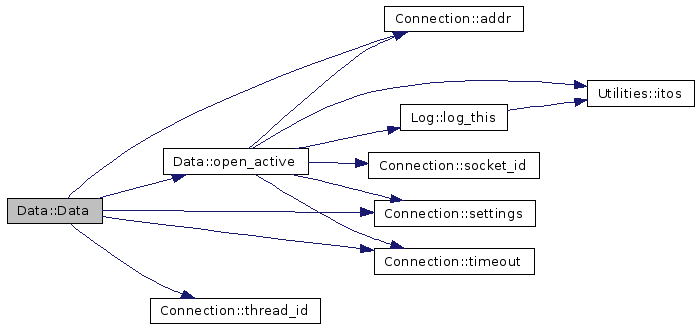
Definition at line 138 of file Data.cpp. References User::data_vec, User::get_data_it(), Utilities::itos(), Connection::lock, Log::log_this(), logging, Connection::transfered(), TYPE_INFO, user, Connection::user_name(), and util. 00139 { 00140 if(this->_file_id != -1) 00141 close(this->_file_id); 00142 00143 this->user->transfered( 00144 this->user->transfered() + this->transfered()); 00145 00146 if(this->thread_id()) 00147 { 00148 BABY_WRLOCK(user->lock); 00149 user->data_vec.erase(user->get_data_it(this->thread_id())); 00150 BABY_UNLOCK(user->lock); 00151 logging->log_this(4, TYPE_INFO, "data thread " + 00152 util.itos(this->thread_id()) + 00153 " exiting. Remaining data connections for " + user->user_name() + 00154 " is: " + util.itos(user->data_vec.size())); 00155 } 00156 }
Here is the call graph for this function: 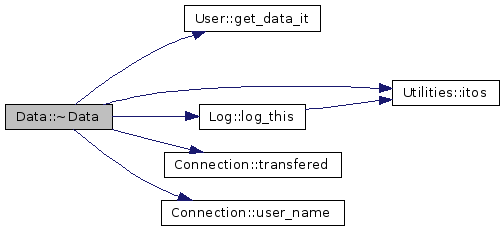
Member Function Documentation
Definition at line 98 of file Connection.h. Referenced by Data(), data_wrapper(), open_active(), open_passive(), and User::User().
Definition at line 138 of file Connection.cpp. References B_RESET, Connection::settings(), and TLS_ENABLED. 00139 { 00140 gnutls_bye(this->session, GNUTLS_SHUT_RDWR); 00141 this->settings(TLS_ENABLED, B_RESET); 00142 return true; 00143 }
Here is the call graph for this function: 
Definition at line 104 of file Connection.cpp. References B_SET, Connection::packet_size(), Connection::session, Connection::settings(), tls_db_delete(), tls_db_fetch(), tls_db_store(), TLS_ENABLED, TLS_INITED, and x509_cred. Referenced by data_wrapper(), and Commands::list(). 00105 { 00106 bool ret = false; 00107 gnutls_init(&session, GNUTLS_SERVER); 00108 00109 gnutls_set_default_priority(this->session); 00110 00111 gnutls_credentials_set(this->session, GNUTLS_CRD_CERTIFICATE, x509_cred); 00112 00113 gnutls_certificate_server_set_request(this->session, GNUTLS_CERT_REQUEST); 00114 00115 gnutls_dh_set_prime_bits(this->session, 1024); 00116 00117 // these are for the connection cache 00118 gnutls_db_set_retrieve_function(this->session, tls_db_fetch); 00119 gnutls_db_set_remove_function(this->session, tls_db_delete); 00120 gnutls_db_set_store_function(this->session, tls_db_store); 00121 gnutls_db_set_ptr(this->session, NULL); 00122 00123 // associating the session with the socket. 00124 gnutls_transport_set_ptr(this->session, 00125 reinterpret_cast<gnutls_transport_ptr>(this->socket_id())); 00126 this->settings(TLS_INITED, B_SET); 00127 00128 if(gnutls_handshake(this->session) >= 0) 00129 { 00130 this->settings(TLS_ENABLED, B_SET); 00131 this->packet_size(gnutls_record_get_max_size(this->session)); 00132 ret = true; 00133 } 00134 00135 return ret; 00136 }
Here is the call graph for this function: 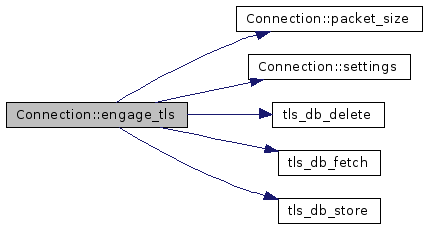
Definition at line 96 of file Connection.h. Referenced by data_wrapper(), User::User(), and Connection::verify_cert().
Definition at line 80 of file Data.cpp. References Connection::addr(), B_RESET, config, DATA_OPEN, general_stru::data_port, Configuration::general, Utilities::itos(), Log::log_this(), logging, Connection::settings(), Connection::socket_id(), Connection::timeout(), TYPE_INFO, and util. Referenced by Data(). 00081 { 00082 this->socket_id(socket(AF_INET, SOCK_STREAM, IPPROTO_TCP)); 00083 00084 int on = 1; 00085 setsockopt(this->socket_id(), SOL_SOCKET, SO_REUSEADDR, 00086 (static_cast<void*>(&on)), sizeof(on)); 00087 struct sockaddr_in my_addr; 00088 my_addr.sin_port = htons(config->general.data_port); 00089 my_addr.sin_addr.s_addr = htonl(INADDR_ANY); 00090 00091 uid_t old_uid = 0; 00092 // if dataport is below 1024 we need root. 00093 if(config->general.data_port <= 1024) 00094 { 00095 old_uid = geteuid(); 00096 seteuid(0); 00097 } 00098 int ret = bind(this->socket_id(), reinterpret_cast<struct sockaddr*> 00099 (&my_addr), sizeof(my_addr)); 00100 if(config->general.data_port <= 1024) 00101 seteuid(old_uid); 00102 00103 if(ret != 0) 00104 logging->log_this(3, TYPE_INFO, 00105 "Failed to bind to data port " + util.itos(config->general.data_port) 00106 + ", falling back to arbitrary port."); 00107 00108 struct sockaddr_in tmp_addr = this->addr(); 00109 00110 // go into nonblocking 00111 long sock_arg = fcntl(this->socket_id(), F_GETFL, NULL); 00112 sock_arg |= O_NONBLOCK; 00113 fcntl(this->socket_id(), F_SETFL, sock_arg); 00114 00115 int sock_err = connect(this->socket_id(), reinterpret_cast<struct sockaddr*> 00116 (&tmp_addr), sizeof(tmp_addr)); 00117 this->addr(tmp_addr); 00118 00119 if(sock_err < 0) 00120 if(errno == EINPROGRESS) 00121 { 00122 struct timeval tv = this->timeout(); 00123 fd_set con_set; 00124 FD_ZERO(&con_set); 00125 FD_SET(this->socket_id(), &con_set); 00126 if(select(this->socket_id() + 1, NULL, &con_set, NULL, &tv) < 0) 00127 this->settings(DATA_OPEN, B_RESET); 00128 } 00129 else 00130 this->settings(DATA_OPEN, B_RESET); 00131 00132 // leave non blocking 00133 long sock_arg2 = fcntl(this->socket_id(), F_GETFL, NULL); 00134 sock_arg2 &= (~O_NONBLOCK); 00135 fcntl(this->socket_id(), F_SETFL, sock_arg2); 00136 }
Here is the call graph for this function: 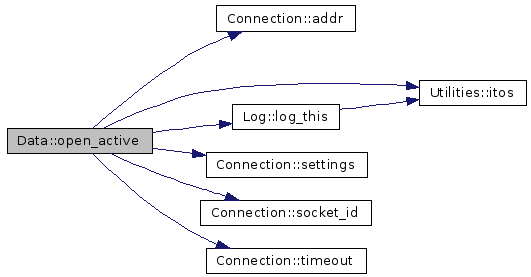
Definition at line 57 of file Data.cpp. References Connection::addr(), B_RESET, DATA_OPEN, Connection::settings(), Connection::socket_id(), Connection::timeout(), and user. 00058 { 00059 socklen_t len = sizeof(this->addr()); 00060 struct sockaddr_in temp_addr = this->addr(); 00061 00062 fd_set acc_set; 00063 FD_ZERO(&acc_set); 00064 FD_SET(user->data_id(), &acc_set); 00065 struct timeval tv = this->timeout(); 00066 00067 if(select(user->data_id() + 1, &acc_set, NULL, NULL, &tv) > 0) 00068 { 00069 int ret = accept(user->data_id(), 00070 reinterpret_cast<struct sockaddr*>(&temp_addr), &len); 00071 this->socket_id(ret); 00072 this->addr(temp_addr); 00073 } 00074 else 00075 this->settings(DATA_OPEN, B_RESET); 00076 00077 close(user->data_id()); 00078 }
Here is the call graph for this function: 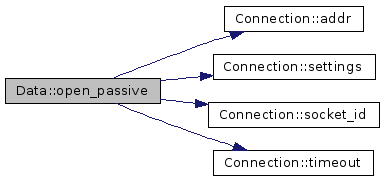
Definition at line 96 of file Connection.cpp. References B_SET, FAILURE, and Connection::settings(). 00097 { 00098 if(this->send(message.c_str(), message.size()) < 0) 00099 this->settings(FAILURE, B_SET); 00100 return *this; 00101 }
Here is the call graph for this function: 
Definition at line 91 of file Connection.cpp. References Utilities::itos(), and util.
Here is the call graph for this function: 
Definition at line 99 of file Connection.h. Referenced by data_wrapper(), and Connection::engage_tls().
Definition at line 74 of file Connection.cpp. References Connection::_packet_size, TLS_ENABLED, and Connection::transfered(). Referenced by data_wrapper(). 00075 { 00076 assert(len <= this->_packet_size && len > 0); 00077 ssize_t ret = -1; 00078 00079 #ifdef USE_TLS 00080 if(this->settings(TLS_ENABLED)) 00081 ret = gnutls_record_recv(this->session, message, len); 00082 else 00083 #endif 00084 ret = read(this->socket_id(), message, len); 00085 00086 this->transfered(this->transfered() + ret); 00087 00088 return ret; 00089 }
Here is the call graph for this function: 
Definition at line 47 of file Connection.cpp. References Connection::_packet_size, Utilities::itos(), Log::log_this(), logging, TLS_ENABLED, Connection::transfered(), TYPE_INFO, and util. Referenced by data_wrapper(). 00048 { 00049 assert(len <= this->_packet_size && len > 0); 00050 ssize_t ret = -1; 00051 00052 BABY_WRLOCK(this->lock); 00053 #ifdef USE_TLS 00054 if(this->settings(TLS_ENABLED)) 00055 { 00056 ret = gnutls_record_send(this->session, message, len); 00057 if(ret == GNUTLS_E_AGAIN || ret == GNUTLS_E_INTERRUPTED) 00058 ret = gnutls_record_send(this->session, message, len); 00059 } 00060 else 00061 #endif // USE_TLS 00062 ret = write(this->_socket_id, message, len); 00063 00064 BABY_UNLOCK(this->lock); 00065 if(ret < 0) 00066 logging->log_this(3, TYPE_INFO, "write to socket " + 00067 util.itos(this->socket_id()) + " failed: %m"); 00068 else 00069 this->transfered(this->transfered() + ret); 00070 00071 return ret; 00072 }
Here is the call graph for this function: 
Definition at line 80 of file Connection.h. References Connection::_settings, B_FLIP, B_RESET, and B_SET. 00081 { 00082 BABY_WRLOCK(this->lock); 00083 if(way == B_SET) 00084 this->_settings.set(bit); 00085 else if(way == B_RESET) 00086 this->_settings.reset(bit); 00087 else if(way == B_FLIP) 00088 this->_settings.flip(bit); 00089 BABY_UNLOCK(this->lock); 00090 }
Definition at line 72 of file Connection.h. References Connection::_settings, and TOTAL_U_BIT. 00073 { 00074 assert(bit < TOTAL_U_BIT); 00075 BABY_RDLOCK(this->lock); 00076 bool b = this->_settings.test(bit); 00077 BABY_UNLOCK(this->lock); 00078 return(b); 00079 }
Definition at line 68 of file Connection.h. References Connection::_settings. Referenced by Data(), data_wrapper(), Connection::disengage_tls(), Connection::engage_tls(), Handler::init(), Handler::initializer(), Commands::list(), open_active(), open_passive(), Connection::operator<<(), User::operator>>(), Commands::retr(), and Commands::stor(). 00069 { 00070 return _settings; 00071 }
Definition at line 97 of file Connection.h. Referenced by open_active(), open_passive(), and User::User().
Definition at line 100 of file Connection.h. Referenced by Data(), User::login(), open_active(), open_passive(), User::operator>>(), and User::User().
Definition at line 102 of file Connection.h. Referenced by Connection::receive(), Connection::send(), and ~Data().
Definition at line 101 of file Connection.h. Referenced by data_wrapper(), Connection::verify_cert(), and ~Data().
Definition at line 145 of file Connection.cpp. References config, Configuration::general, Connection::host_name(), Utilities::is_set(), Log::log_this(), logging, TYPE_AUTH, TYPE_DEBUG, Connection::user_name(), util, and general_stru::verify_client. 00146 { 00147 bool ret = false; 00148 if (gnutls_certificate_type_get(this->session) == GNUTLS_CRT_X509) 00149 { 00150 int verified = gnutls_certificate_verify_peers(this->session); 00151 if(util.is_set(verified, GNUTLS_CERT_REVOKED)) 00152 logging->log_this(2, TYPE_AUTH, this->user_name() + 00153 + " tried to login with a revoked certificate."); 00154 else if(!util.is_set(verified, GNUTLS_CERT_INVALID) && 00155 !util.is_set(verified, GNUTLS_CERT_SIGNER_NOT_FOUND)) 00156 { 00157 unsigned int cert_list_size = 0; 00158 // I really hope gnutls has their locking code in shape. get_peers just 00159 // gives us some memory.. *shudder* 00160 const gnutls_datum *cert_list = gnutls_certificate_get_peers( 00161 this->session, &cert_list_size); 00162 if(cert_list_size > 0) 00163 { 00164 gnutls_x509_crt peer_cert; 00165 gnutls_x509_crt_init(&peer_cert); 00166 gnutls_x509_crt_import(peer_cert, &cert_list[0], GNUTLS_X509_FMT_DER); 00167 char dn_buf[200] = {0}, ca_buf[200] = {0}; 00168 size_t buf_size = 199, ca_size = 199; 00169 gnutls_x509_crt_get_dn(peer_cert, dn_buf, &buf_size); 00170 gnutls_x509_crt_get_issuer_dn(peer_cert, ca_buf, &ca_size); 00171 if(buf_size > 0 && ca_size > 0) 00172 { 00173 // here we call an external program to ask if this user may login 00174 // with this cert. 00175 // format is "<user> <host/ip> <ca-dn> <cert-dn>" 00176 string call = config->general.verify_client + " " + 00177 this->user_name() + " " + this->host_name() + 00178 " \"" + ca_buf + "\" \"" + dn_buf + "\""; 00179 logging->log_this(5, TYPE_DEBUG, "running:" + call); 00180 int approved = system(call.c_str()); 00181 if(WEXITSTATUS(approved) == 0) 00182 ret = true; 00183 } 00184 gnutls_x509_crt_deinit(peer_cert); 00185 } 00186 } 00187 } 00188 return ret; 00189 }
Here is the call graph for this function: 
Member Data Documentation
Definition at line 94 of file Connection.h. Referenced by Connection::Connection(), Data(), and Connection::settings().
Definition at line 58 of file Connection.h. Referenced by Commands::retr(), Commands::stor(), and ~Data().
Definition at line 29 of file Data.h. Referenced by Data(), data_wrapper(), Commands::list(), open_passive(), Commands::rest(), Commands::retr(), Commands::stor(), and ~Data().
The documentation for this class was generated from the following files: |
|||||||||||||||||||||||||||||||||||||||||||||||||||||||||||||||||||||||||||||||||||||||||||||||||||||||||||||||||||||||||||||||||||||||||||||||||||||||||||||||||||||||||||||||||||||||||||||||||||||||||||||||||||||||||||||||||||||||||||||||||||||||||||||||||||||||||||||||||||||||||||||||||||||||||||||||||||||||||||||||||||||||||||||||||||
- Copyright © 2005, BabyFTPd
- Powered by:


